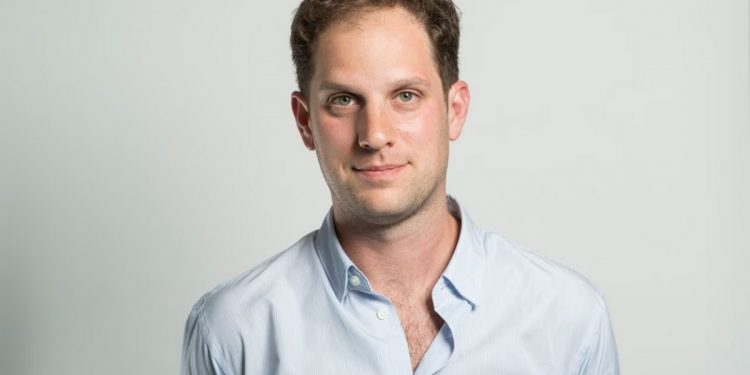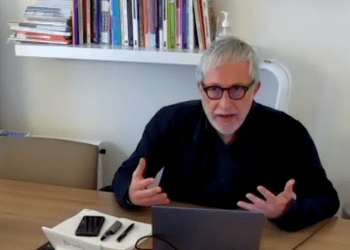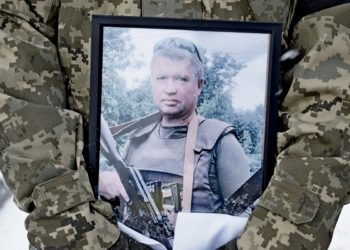The Lefortovo Court of Moscow arrested The Wall Street Journal journalist Evan Gershkovich on espionage charges. This was reported by Russian state news agencies. The Federal Security Service detained the correspondent in Yekaterinburg on March 29.
Arrests of journalists of foreign publications on charges of espionage are sporadic. Usually, they are expelled from the country in such cases, Radio Liberty notes. According to them, Gershkovich’s case is the first such case since the end of the Cold War. In 1986, the KGB arrested U.S. News&World Reports journalist Nicholas Daniloff. Secret materials were thrown at him. Less than a month later, he was exchanged for Grigory Zakharov, an employee of the Soviet diplomatic mission to the United Nations, who was arrested for espionage.
Currently, the FSB claims that a journalist with American citizenship collected secret information about one of the enterprises of the military-industrial complex on the order of the United States. Details of the accusation are not provided. The Kremlin says that Gershkovich was “caught at the crime scene.” He faces up to 20 years in prison. The Wall Street Journal categorically denies the accusation. The statement says that the editorial office is deeply concerned about the safety of its employee. Evan Gershkovich has lived in Moscow for six years and is accredited by the Russian Ministry of Foreign Affairs.
The press service of the Moscow judges reports that Gershkovich has been sent to remand prison until May 29, 2023. Gershkovich was denied access to his lawyer, saying that he had already been appointed. Journalists were not allowed to attend the court session. The correspondent of Mediazona managed to see how the American with a hood on his head and handcuffs fastened behind his back was led towards the convoy stairs.
In July, Russia, Venezuela, Iran, China, the North Korea, and Myanmar were put on the list of countries with an increased risk of wrongful detention of Americans compiled by the U.S. State Department. American experts directly accuse Moscow of taking hostages to exert pressure on Washington and exchange them for Russians arrested on criminal charges, including espionage.
“The international organization Reporters Without Borders said on Twitter that ‘Journalists should not be targeted!'”
What is the characteristic of this case?
Firstly, it is a gross infringement of the rights of journalists and encroachment on the freedom of speech, which was applied by Russia after testing such techniques on journalists in Crimea and other temporarily occupied territories. If journalists in Crimea can be tried not for trespassing on state secrets but for “participation in Hizb ut-Tahrir,” for terrorism, or even for “preparation for the overthrow of the state order in Russia,” why can’t a journalist be arrested in Russia itself, even though he is an American, and then put a bunch of state secrets in his bag, or a grenade like it was done for Vyacheslav Yesypenko. It is also possible to “find” explosives, as was the case with Iryna Danylovych.
By the way, while torturing Yesypenko, the Crimean FSB investigators demanded that he confess that he “photographed places of mass events organized by residents,” not even realizing that the work of a journalist consists precisely in being at places of mass gatherings and taking pictures of people there and area and ask questions about public opinion. It was not for nothing that the accusation of espionage was later dropped, and instead, a grenade appeared, which Yesypenko could not have, but which, according to them, he was going to “fend off the Crimean Tatars with.” That’s an absurdity.
They initially incriminated a completely absurd charge for Iryna Danylovych, transmitting non-classified information to another state. So, what’s the crime? The information is not a secret, is it?
Secondly, it is quite possible Russia was very anxious to release some of its spies or other criminals from an American prison. Gershkovich just presented himself as a convenient candidate for exchange.
Thirdly, Russia once again proved that the racism that is developing in the country is not going to grant not only foreign journalists but also to its citizens any right to freedom of speech or the right to know what the state is doing behind high fences scattered throughout the country.
The data on Gershkovich’s work, which the FSB itself disseminates in indignation, show that he did not conduct espionage activities. Thus, the FSB claims that “he collected information about defense enterprises, as well as about the opinion of Russians about the so-called special military operation (SMO) and the Wagner private military company.” In another version, the American journalist allegedly “gathered data on public opinion regarding the special operation.” First, “the opinion of the Russians about the SMO and Wagner does not constitute any state secret. Every day, thousands of journalists and sociologists collect information “about public opinion,” and no one arrests them. This information interests people from all over the world, and Gershkovich asked entirely legitimate questions for a journalist. By the way, the FSB itself, as far as is known, daily collects various data on public opinion for internal reports to the superiors, and all agents are still walking free.
The FSB explained that: “Evan Gershkovich, under the instructions of the U.S., was engaged in collecting information about one of the enterprises of the Russian military industry, which constitute a state secret.”
The first phrase here is farfetched. As an American journalist, he collected information (this is every journalist’s job – to collect information) on behalf of the United States. Of course, who else could give an assignment to an American journalist? But this is a complete fabrication of the FSB itself because she does not have a piece of paper that says: “Gershkovich’s task is to collect information about such and such a plant.” This is just a fantasy of Russian Pinkertons, the result of espionage in Russia.
Secondly, according to the law, the person entrusted with the task of preserving this information, and not the one who learned about it, is responsible for preserving truly secret information. So, why does the FSB report not include the name of the person who gave Gershkovich the secret? After all, it was not lying on the street but was hidden somewhere; someone was supposed to get it and hand it over to the journalist. But because no one carried it, just as Gershkovich himself did not collect it.
Let’s go further. “Publicist Yaroslav Shyrshykov, who worked in Yekaterinburg with the detained journalist, told Gazeta.Ru that the journalist first flew to Yekaterinburg one and a half to two weeks ago, then returned to collect material. It is also known that Gershkovich traveled to Nizhny Tagil. The Uralvagonzavod defense enterprise is located there.
Vyacheslav Vegner, a member of the Sverdlovsk Legislative Assembly, who Gershkovich interviewed, told the 66.ru portal that the journalist asked questions about Russian support for hostilities and humanitarian aid, as well as about Wagner. In addition, according to Vegner, Gershkovich asked him about the reorientation of the work of industrial enterprises and the shortage of personnel. “During the conversation, I told him: ‘You’ll mess everything up in your newspaper anyway.’ To which he says: ‘No, I will write only the truth,'” Vegner continued and added that the conversation was generally friendly, and they drank a bottle of cognac together.
Again, first of all, the whole world has known for a long time that Russia produces tanks at the Uralvagonzavod in Nizhny Tagil, which are very obsolete. What could Gershkovich learn about Uralvagonzavod that could be of interest to the American manufacturers of Abrams tanks, next to which Russian tanks were not built? On the contrary, the Russians are interested in learning the technologies and secrets of American tanks, not the Americans.
Secondly, none other than the Deputy Chairman of the Security Council of Russia, Dmitry Medvedev, recently revealed a terrible Russian secret and informed the whole world that “there is no reason to panic” and that everything is “under complete control.” The key phrase was that it is planned to produce 1,500 tanks at the factory in 2023. So, why was Gershkovich arrested and not Medvedev, who announced this terrible secret?
Secondly, the testimony of Yaroslav Shyrshykov and Vyacheslav Vegner says that Gershkovich was not engaged in espionage because the questions they talk about are common journalistic questions millions of journalists around the world ask in their interviews every day. After all, this is exactly what their work is about.
The official representative of the Russian Ministry of Foreign Affairs, Maria Zakharova, stated that Gershkovich’s work in Yekaterinburg “has nothing to do with journalism.” According to her, this is not the first time that foreigners have used the status of journalists to cover up activities that are “not journalism.” For some reason, the whole world is convinced that this work of Zakharova herself has nothing to do with journalism, and Gershkovich is just a recognized professional. In this regard, The Wall Street Journal editors stated that they reject the accusations of espionage brought against their reporter Evan Gershkovich: “The Wall Street Journal categorically rejects the FSB’s accusations and demands the immediate release of our trusted and dedicated reporter Evan Gershkovich. We sympathize with Evan and his family.”
NUJU information service

 THE NATIONAL UNION OF
JOURNALISTS OF UKRAINE
THE NATIONAL UNION OF
JOURNALISTS OF UKRAINE
















Discussion about this post